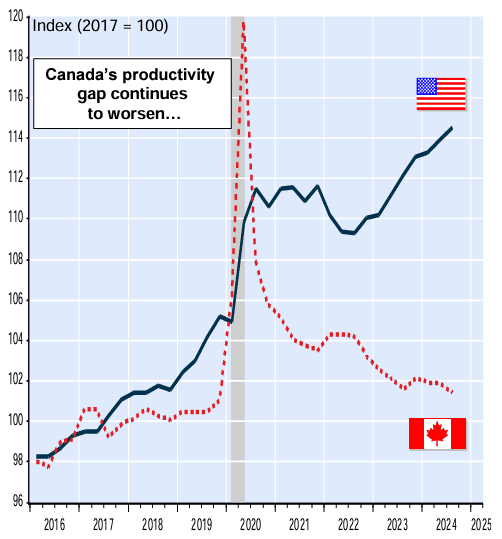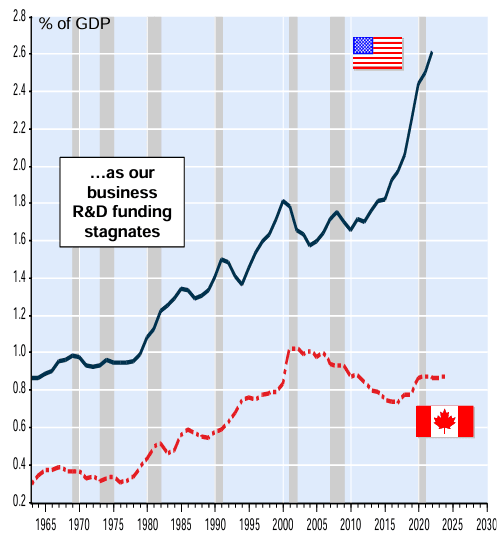
Image © Adobe Images
Canada’s productivity crisis has reached what Stéfane Marion, Chief Economist at National Bank of Canada, calls an “obscene” gap compared to the United States.
Newly released data shows Canadian business sector productivity contracted at an annualised rate of 1.5% in Q3 2024, marking the third consecutive quarterly decline and the ninth in the past ten quarters. Meanwhile, U.S. productivity surged 2.2% in the same period, achieving its eighth consecutive increase.
“The Canada-U.S. productivity differential has become outright obscene,” Marion said. “It’s a stark reminder of the structural issues holding Canada back.”
Above: Business sector labour productivity. Source: NBC Economics and Strategy (data via Statistics Canada, Bureau of Economic Analysis).
Lagging Research and Development Spending
A key factor behind Canada’s productivity struggles is its lackluster investment in research and development (R&D). According to Statistics Canada, business sector R&D spending is projected to represent just 0.9% of GDP in 2024, compared to 2.6% in the U.S.
“This is a historical low point,” Marion noted. “Going back to 1963, the gap between R&D spending by Canada’s business sector and that of the U.S. has never been as wide as it is today.”
R&D is widely recognized as a critical driver of productivity growth. The disparity in spending, Marion argues, is a significant impediment to Canada’s ability to compete globally and enhance its standard of living.
Above: Business sector R&D funding. NBC Economics and Strategy (data via Statistics Canada, Bureau of Economic Analysis).
Long-Term Implications
The persistent productivity downturn has broad implications for Canada’s economic future. Declining productivity stifles wage growth, hampers economic expansion, and limits the country’s ability to compete on the global stage.
“Without urgent action, this trend threatens to erode our standard of living,” Marion warned. “Canada must urgently develop policies to incentivize businesses to increase their investments domestically.”
Policy Recommendations
Marion emphasized the need for targeted government interventions to address the productivity gap, including:
- Tax Incentives for R&D: Encouraging businesses to invest in innovation.
- Infrastructure Investments: Improving physical and digital infrastructure to boost efficiency.
- Talent Development: Addressing skill shortages to enhance workforce productivity.
“It goes without saying that a national strategy to bolster business investment is no longer optional—it’s essential,” Marion says.
A Wake-Up Call
As Canada’s productivity continues to lag behind its southern neighbor, Marion’s observations highlight the urgency of reversing the trend. Without decisive action, Canada risks falling further behind in the global economy, leaving its businesses and citizens at a disadvantage.
This productivity crisis, Marion argues, is not just an economic issue but a call to action to secure Canada’s long-term prosperity.


